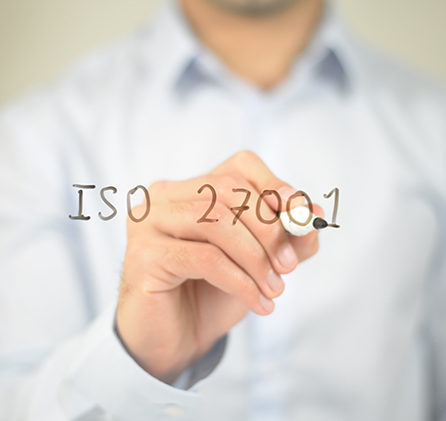ISO 27001 and Cyber Essentials complement each other to provide organisations with protection against cyber and security threats. While they share a common goal, there are subtle differences in the requirements and implementation of each.
The need for investing in cyber security is essential, as businesses are becoming increasingly vulnerable to the adverse effects of cyber threats. Across 2022, 39% of UK businesses were subject to a cyber attack, which underlines the need for action to identify threats and tighten up your security measures.
So, if you need an overview of what ISO 27001 and Cyber Essentials are and the benefits they can provide for your business, then you’ve come to the right place. In this blog post, we’ll look at both the ISO 27001 Standard and Cyber Essentials, explaining the difference between both and how ISO 27001 certification can help you achieve greater security across your organisation.
What are Cyber Essentials?
Cyber Essentials is a widely-recognised, government-backed certificate, created for all organisations of any size. It’s a self-assessment option that helps you to protect your organisation against 80% of the most common cyber-attacks and data breaches.
The framework of Cyber Essentials covers five key controls:
- Secure configuration – If your web servers aren’t configured correctly, you’re open to vulnerabilities. Carry out due diligence to ensure computers and networks are configured to prevent any unauthorised actions from being carried out.
- Internet connection and antivirus software – If your connection is unsecured, then access from unauthorised sources can occur. Ensuring control over who can access your system and how is essential. Firewalls and antivirus software help to negate the threat of malware, viruses and any external threats.
- Controlled access – Ensuring only authorised individuals have certain access rights is key. This minimises the likelihood of the system being exploited by cyber attackers by offering limited access to applications and networks.
- Malware protection – Any software which can be exploited to access files and documents on your network is essential. Malware can cause businesses great difficulties if it attacks your system, accessing personal data and files which threaten your security. Having malware protection is critical to eradicating the threats posed by this software.
- Updating software and systems – If systems are outdated, then the threat of attack is increased. Updating software and systems promptly when required is key to preventing cyber criminals from exploiting any vulnerabilities in your systems.
ISO 27001 explained
ISO 27001 is the international Standard for information security management systems. It’s one of the most popular Standards and for good reason. It shows your customers you’re committed to safeguarding their information and take security seriously.
This industry-recognised security framework will help take your business to the next level with best practices in place to manage information security. You can protect your business from the rising threat of cybercrime, show customers you’re all about security and get recognised for being safe to work with. And the great thing about ISO 27001 is it looks at information security across all areas of your business – online and offline.
With ISO 27001, you can show your business has the right security and defences in place, boosting your reputation and attracting new business. To find out more about what ISO 27001 is, check out our dedicated blog post here.
What is the difference between ISO 27001 and Cyber Essentials?
As we mentioned at the start of this blog, ISO 27001 and Cyber Essentials are both great tools to protect information security. The main difference between the two is how they are recognised as certifications. Cyber Essentials is a government-backed certificate, whereas ISO 27001 is an international Standard of certification.
Whilst Cyber Essentials is limited to focusing on IT, ISO 27001 offers a more comprehensive framework, covering all information, whether it’s online or offline. It encompasses people, processes and technology, offering greater scope for the overall protection of information security.
ISO 27001 vs Cyber Essentials
When comparing the two certifications, there are some important points to note. Here is a brief overview of the differences provided by both frameworks.
Cyber Essentials
- Protects IT infrastructure as a whole, incorporating data, servers and computers.
- Helps organisations implement basic cyber security measures.
- Provides five key controls that require implementation.
- Any organisation bidding for UK government contracts that require handling sensitive data and information must demonstrate Cyber Essentials certification.
ISO 27001
- ISO 27001 Certification provides an all-round layer of protection for information stored in hard format or electronically.
- Helps organisations from any sector and of any size to demonstrate commitment to information security and the secure maintenance of assets.
- The structure of ISO 27001 is much broader, incorporating 93 different ISO 27001 security controls under four different themes.
- Implementing ISO 27001 provides businesses with a solid foundation to achieve continual improvement and helps improve best practice across an organisation. Certification also offers reassurance to clients and customers that the organisation is committed to information security.
Why ISO 27001 is important to safeguard cyber security for your business?
The range of control sets outlined in the ISO 27001 Standard provides extensive guidance and criteria to protect your business from the threat of cyber attacks. The focus on people and processes provides a granular scope for a wider range of information security measures to be implemented. What does this mean? Well, ultimately, it’s a healthier, detailed approach to cyber security for your business, as more ISO 27001 processes and procedures are adopted as part of the Standard.
It makes it easier to identify security threats and ensure the required policies and processes are in place. From there, your business can start to explore better work opportunities, bidding for bigger contracts and winning tenders courtesy of ISO 27001 certification. You’ll also save time and money by reducing the threat of a security breach, and help boost your reputation to clients and customers through your commitment to information security.
Check out our dedicated webpage to discover more ISO 27001 benefits.
Gain ISO 27001 Certification with us
Now that you know about the differences between ISO 27001 and Cyber Essentials, perhaps now it’s time to start your journey towards certification.
Citation ISO Certification can help your business do just that, with our tailored approach to ISO 27001 certification helping to transform your business. We can help your business get certified in as little as 45 days!
You’ll also get access to our bespoke Atlas Hub management system, where you can manage your ISMS in one single location, and access all the relevant documents, reports and reviews you need.
We also now offer certification to ISO 27001:2022, which includes all the latest changes and reviews to the ISO 27001 Standard. Check out our blog post here for further information.
To request a quote today, please contact our friendly, professional team to discuss your options at 0333 344 3646. Let Citation ISO Certification help your business get ISO 27001 certified, helping to improve your approach to information security!

